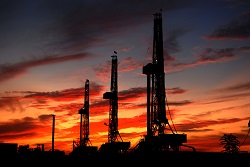- Home page /
- New technologies and equipment /
- One way to solve fracing water problems: Don’t use water
One way to solve fracing water problems: Don’t use water
 |
| Courtesy of energyfuse.com |
The shale gas revolution brought the U.S. both energy-superpower status and a short list of headaches. There are engineering challenges, many wells have a disappointingly short productive lifetime, and those lifetimes can vary even within the same field.
Then there are the much-debated environmental trade-offs. Hydraulic fracturing requires copious water. And while gas-fired power plants produce less CO2 than coal-fired plants, environmentalists are quick to point out that methane itself is a potent greenhouse gas and leaks needlessly from aging infrastructure.
An Australian researcher and two scientists from France, which has banned fracing, now suggest there may be a better way. And it's a twofer, at least.
Their germ of an idea, published today in the journal Nature Communications, would simultaneously reduce or eliminate drilling's water footprint, make wells more productive, and trap carbon dioxide underground. How? Substitute high-pressure CO2 for water.
The scientists go to great lengths in the paper and in conversation to qualify their research as preliminary. It's a theoretical study, run on computer models of molecular behavior, and requires experiments on laboratory scales before anyone ever tries it out on an actual shale deposit.
The three co-authors use sophisticated software that simulates how molecules interact. What they found in their simulation is that while water initially flushes out the gas, eventually it becomes a kind of molecular seal, trapping the gas in the deposit.
"Even if this effect remains to be established experimentally, it seems to explain a number of facts observed in shale plants, such as the rapid decline in productivity curves," said Benoit Coasne, a materials scientist affiliated with the French National Center for Scientific Research and MIT, and an author of the study.
Substitutes for water may do a better job at liberating the gas. Highly pressurized CO2 not only pushes out the methane molecules without creating the seal that water does, but also might stay underground and out of the atmosphere.
The CO2 must be "supercritical," a state that's neither solid nor liquid. That's not cheap to make, but the researchers are trying to come up with scientifically sound ideas that might reinvent shale gas production, not engineered tools ready to deploy. Not yet. They also studied the physics of propane as a possible fracing fluid.
The study launches from an easy-to-overlook observation: Despite its prominence on the energy scene, fracing isn't all that well understood at a molecular level. The research aims to lift the veil, or begin to, Coasne said. It was motivated by a desire to help cultivate new directions for debate among the public.
Source: worldoil.com

